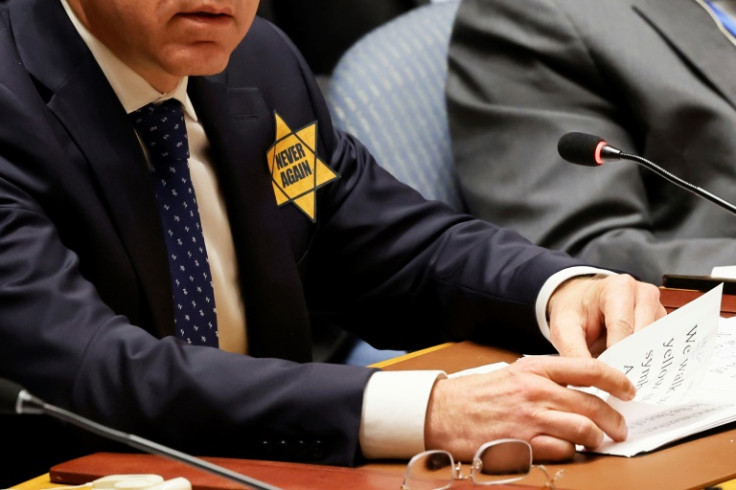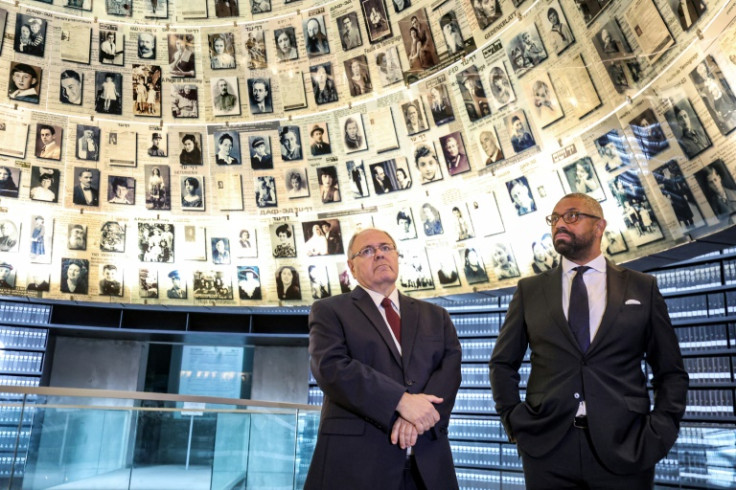Israel Envoy Wears Yellow Star At UN, Drawing Yad Vashem Criticism

Israel's United Nations ambassador displayed a yellow star on his chest Monday as he addressed the Security Council, provocatively pledging to wear the badge until members of the body condemn Hamas "atrocities".
His wearing of the badge, which has come to symbolise the oppression of Jews since its imposition in Nazi-occupied Europe, was swiftly criticised by Yad Vashem, Israel's Holocaust memorial, which urged him to wear the Israeli flag instead.
Israel's envoy to the world body, Gilad Erdan, on Monday denounced the Security Council for "staying silent" over the unprecedented deadly attacks by Hamas Palestinian militants against Israel on October 7.
"Some of you have learned nothing in the past 80 years," he said. "Some of you have forgotten why this body was established."
The deeply divided 15-member council has not adopted a single resolution on the more than three-week-long war between Israel and Hamas.
"So, I will remind you. From this day on, each time you look at me you will remember what staying silent in the face of evil means," the ambassador said.
"Just like my grandparents, and the grandparents of millions of Jews, from now on my team and I will wear yellow stars," he said, standing up to affix one on the breast of his suit inscribed with the words "Never Again".
But Erdan said he would wear it "as a symbol of pride".
"We will wear this star until you wake up and condemn the atrocities of Hamas."
Yad Vashem chairman Dani Dayan said he was "sorry to see" the move by the Israeli delegation in New York.
"This act disgraces the victims of the Holocaust as well as the state of Israel," Dayan said in a Hebrew-language post on X, formerly Twitter.
"The yellow star symbolises the helplessness of the Jewish people and their being at the mercy of others. We now have an independent state and a strong army. We are the masters of our own fate. Today we will fasten to our lapel a blue and white flag, not a yellow star."
Israeli Prime Minister Benjamin Netanyahu has called the October 7 attacks, which Israeli officials say killed 1,400 people, the worst against the Jewish people since the Holocaust.
For weeks the Security Council has been riven by divisions over the war and its impact, rejecting four draft resolutions about the conflict.
Some texts were blocked by the United States, a close Israel ally, because they did not mention Israel's right to defend itself.
Another presented by the Americans was stymied by Russia and China in particular because it did not clearly call for a ceasefire.
In light of the deadlock, the UN General Assembly last Friday adopted by a large majority a nonbinding resolution requesting an "immediate humanitarian truce," but without mentioning Hamas.
Israel, through Erdan, blasted the text, saying it will "go down as infamy".
During Monday's Security Council meeting, several speakers, while denouncing the Hamas attacks, highlighted the price paid by inhabitants of Gaza, where the Hamas-run health ministry says more than 8,300 people have been killed.
Philippe Lazzarini, head of the UN agency for Palestinian refugees, said the siege of Gaza amounts to collective punishment of its residents.

© Copyright AFP 2025. All rights reserved.





















